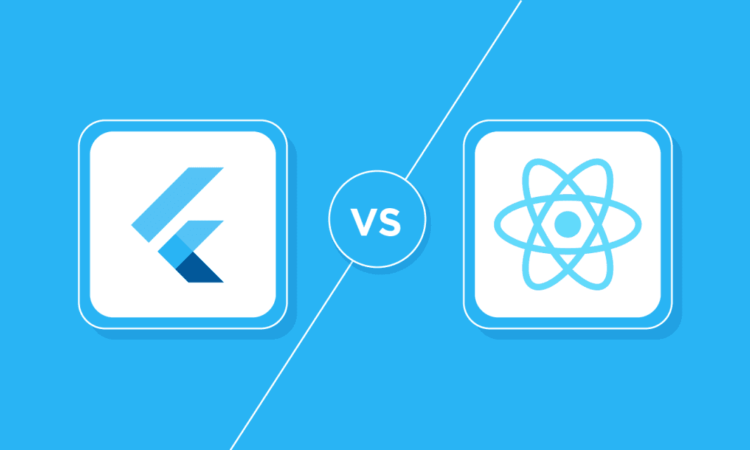Did you know? 46% of software developers pick Flutter as their tool to develop cross-platform apps over other frameworks in the market.
But does that mean you should also choose Flutter? Of course not. We cannot pick one just because it is popular.

We should carefully examine its features, pros, and cons. We should also compare it with its close competitors, like React Native, to see which one might best serve our needs.
In this article, we will compare Flutter and React Native and provide a comprehensive analysis that can help you decide between the two.
Let’s start by understanding what these platforms are.
Flutter: What Is It?
Created by Google, Flutter is a free and open-source UI software development kit. It is designed to create native application interfaces on different platforms, like iOS, Android, Linux, Mac, Windows, Google Fuchsia, and the web. Some popular apps, like Google Ads and Alibaba, are built using Flutter.
Learning Flutter can be an easy game if you already know a bit about the Dart programming language.
React Native: What It Is?
React Native is a unique yet popular framework that helps people create phone apps. Facebook made it suitable for making apps that work on both iPhones and Android phones. Some famous apps like Meta (earlier called Facebook), Instagram, Skype, and Amazon are built using React Native.
Furthermore, if you already know a bit about a programming language called JavaScript and another thing called React, learning React Native will not take more than about 4 to 5 days. However, if you’re new to these things, no doubt this will take time.
Now, let’s dive into the comparative analysis of both platforms (Flutter and React Native).
Flutter vs. React Native: The Top 5 Differences You Should Know
1. Learning Curve: Which One Is Easy to Adopt?
React Native uses JavaScript, which many software developers use today. The survey shows there will be about 17.4 million JavaScript coders in 2022. Now, Flutter is all about using Dart.
So, let’s have a glimpse at JavaScript vs. Dart.
JavaScript is a wise old language in the IT world. It’s been around for a long time and thus has a strong developer community. While learning this language, you have many resources to get help. Many people find it easy to use JS for their development purposes.
Furthermore, Dart is a bit of a newer language in this industry. Not many people knew about it until Google brought it in. Dart is similar to another language called Java, so if you already know Java, it is easier to learn.
So, for those who already know JavaScript, it might be easier to start with React Native, and those who know Dart can quickly start with Flutter.
2. Performance: Who Is More Speedy?
Flutter is a bit fast as it uses a unique method (AOT compilation). It talks directly to the device’s hardware, omitting the need for a JavaScript bridge, thus reducing the app’s loading time.
On the other hand, React Native utilizes a JavaScript bridge to interact with native elements, resulting in slower performance than Flutter. However, since React Native uses JavaScript, the apps developed with it tend to be smaller.
When you hire React Native developers, they might use several optimization techniques to enhance the performance, but Flutter’s natural performance superiority provides it an edge.
3. Development and Debugging: Which One Has More Tools?
React Native boasts a wide array of development tools and debugging capabilities. With tools like Metro Bundler and Jest available, debugging becomes relatively more straightforward. The vast community support further assists in faster problem-solving and practical learning.
On the contrary, although newer, Flutter also comes with strong development tools like Dart DevTools, which offer a range of functionalities, including a widget inspector, source-level debugger, timeline view, and memory profiler.
However, Flutter has a smaller community base than React Native, which might make finding immediate solutions difficult.
4. UI Components
Regarding providing the tools for UI development, both Flutter and React Native have their strengths.
React Native allows you to create native applications and offers ready-to-use components that accelerate development.
However, Flutter is often appreciated for its extensive widget library, which allows developers to create customizable and complex UIs more easily. When hiring Flutter developers, Material Design and Cupertino for Android and iOS platforms are the two most common UI widgets.
5. Documentation: Which one is well-organized?
Documentation is a vital part of any framework or programming language. In this case, Flutter has excellent documentation, which is well-organized and comprehensive, making it easier for developers to find what they’re looking for.
React Native’s documentation is extensive, but many developers find it less organized than Flutter’s.
Flutter vs. React Native: The Key Points
| Feature | Flutter | React Native |
|---|---|---|
| Language | Dart is a new language | JavaScript is popular |
| Performance | As fast as it avoids bridges | Comparatively slower |
| Documentation | Simple and streamlined | Disorganized |
| Community Support | Relatively small | Large |
| User Interface | Pre-built widgets, fewer UI customizations | External UI kits, more UI options |
Final Verdict
Flutter and React Native have strengths and weaknesses; the choice depends mainly on your project needs.
Hire dedicated developers who are familiar with these languages and can work on your preferences. If your team is more proficient in JavaScript or you are developing a simple app, React Native might be the way to go. Flutter could be your best bet if you want a high-performance application with a unique UI and can invest time learning Dart.
Therefore, before making any decision, always align the tool you choose with your project’s requirements. Both platforms offer a variety of features and benefits, and with the right development approach, both can help you create amazing cross-platform applications.






